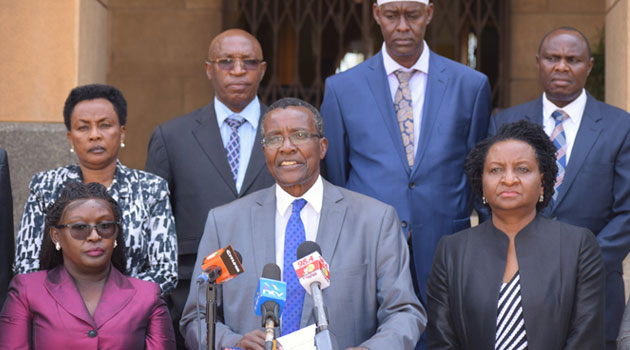
While admitting the petition, the commission noted Justice Ojwang’s refusal to attend a hearing where he would have been accorded an opportunity to defend himself/CFM NEWS
NAIROBI, Kenya, Mar 20 – The Judicial Service Commission (JSC) has recommended the formation of a tribunal to probe the conduct of Justice Jackton Ojwang of the Supreme Court, after admitting a petition seeking his removal over misconduct, impropriety and conflict of interest.
The recommendation sets the stage for the suspension of Justice Ojwang under Article 168 (5) of the Constitution which requires the President to form the tribunal within 14 days.
“The President shall, within 14 days after receiving the petition, suspend the judge from office and act in accordance with the recommendation of the Judicial Service Commission,” the Article stipulates.
Justice David Maraga who spoke after chairing a JSC meeting on Wednesday said the petition will be relayed to President Uhuru Kenyatta during the course of the day who will then appoint a tribunal as required by law.
“The petition – filed by Nelson Oduor Onyango and eight others – detailed instances which the petitioners believed constituted grounds of misconduct, impropriety, conflict of interest and breach of judicial code of conduct on the part of the Hon Judge,” Maraga stated.
The complainants singled out Justice Ojwang’s involvement in a miscellaneous application 49 of 2014 between the Awendo Town Council and the petitioners “despite being conflicted and being closely associated with the County Government of Migori and the Governor Okoth Obado.”
While admitting the petition, the commission noted Justice Ojwang’s refusal to attend a hearing where he would have been accorded an opportunity to defend himself.
“The full Commission deliberated on the same (committee report) at great length and found that the petition had disclosed sufficient ground to warrant a recommendation to the President to set up a tribunal for the removal of the Justice Prof Jackton B. Ojwang and accordingly adopted it.”
Under Article 168 of the Constitution, judges of superior courts (Supreme Court, Court of Appeal, and High Court) can be removed from office on grounds of mental or physical incapacity, breach of prescribed code of conduct, bankruptcy, incompetence, and gross misconduct.
Article 168 (5) empowers the President to, upon receiving a petition from JSC , appoint a six-member tribunal comprising among others an advocate and two persons with experience in public affairs.
“The Judicial Service Commission shall consider the petition and if it is satisfied that the petition discloses a ground for removal under clause (1), send the petition to the President,” Article 168 (4) reads.
Justice Ojwang is also listed in another petition alongside Justices Mohammed Ibrahim, Smokin Wanjala, and Njoki Ndung’u which the JSC gave the judges 14 days to respond.
“The commission considered a petition filed by Mohamed Mohamud Sheikh against four Judges of the Supreme Court namely Justice Mohammed Ibrahim, Justice Prof Jackton B. Ojwang, Justice Dr Smokin Wanjala and Lady Justice Njoki Ndung’u for alleged gross misconduct, misbehaviour and incompetence, breach of the Constitution and Oath of Office,” CJ Maraga indicated.
The JSC also gave CJ Maraga a similar time-frame to respond to a petition filed against him by Yussuf Dimbil.
“The commission considered a petition filed by Yussuf Ibrahim Dimbil against the Chief Justice David Maraga for alleged gross violations of the Constitution,” JSC noted in a statement.
Judges suspended under Article 168 (5) are entitled to half the remuneration benefits payable to them pending determination of their fate by tribunal.
“Despite Article 160 (4), the remuneration and benefits payable to a judge who is suspended from office under clause (5) shall be adjusted to one half until such time as the judge is removed from, or reinstated in, office,” Article 168 (6) provides.









































